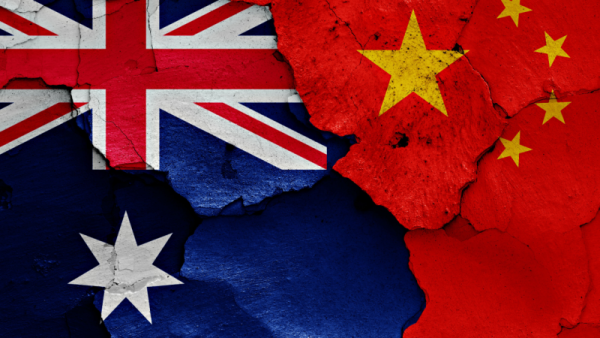danielo / Shutterstock

Elena Collinson, Manager, Research Analysis, Australia-China Relations Institute, University of Technology Sydney |
This article appeared in The Diplomat on July 15 2023.
The Australia-China relationship – which encompasses economic connectedness, strategic and security implications, political and diplomatic ties, and longstanding community and cultural links – pervades myriad aspects of Australian public life both directly and indirectly.
So what do Australians think about the bilateral relationship?
The UTS:ACRI/BIDA Poll 2023 by the Australia-China Relations Institute and the Centre for Business Intelligence & Data Analytics at the University of Technology Sydney, surveyed 2,000 respondents across all Australian states and territories.
Four key themes emerge from this year’s results.
First, the pragmatic thread in Australia-China relations endures, but it continues to find itself under strain.
Despite political tensions over recent years, the fundamental desire for a strong relationship with China remains persistently high, with six in 10 Australians (61 percent) saying that Australia should continue to try to build strong connections and ties, and have a strong relationship with China. This represents a continuation of sentiment from 2022 (60 percent) and 2021 (61 percent).
Moreover, Australians have expressed a preference for strengthening the bilateral relationship and continue to identify its benefits, particularly in tourism and higher education, and support for the maintenance of business ties. There is a quiet strand of optimism, too, that the relationship will continue to improve, with about a third of Australians (32 percent) saying they believe bilateral relations will improve in the next three years.
A clear majority of Australians (80 percent) agree that the responsibility for improving the relationship between Australia and China lies with both countries, although of the two, more Australians believe the onus to make that happen remains with China (46 percent) rather than Australia (31 percent).
At the same time there remain significant levels of mistrust in Australia toward the Chinese government, with 7 in 10 Australians expressing the sentiment that Beijing cannot be trusted.
There are also ongoing and acute fears that Beijing poses a security threat to Australia, and majority support (55 percent), although decreasing over the years, for a tougher Australian government line towards China.
Second, the Australian Labor government’s policy of ‘stabilizing’ the relationship with Beijing appears to be aligned with public sentiments.
The Australian Labor Party is gaining domestic political advantage from being seen as the better party to manage the relationship, with nearly half of Australians saying as such, a jump from 35 percent in 2022. On the other hand, 29 percent of Australians say the Liberal/National coalition are best placed to handle Australia’s China policy, down from 36 percent last year.
Statecraft is perceived as preferable to megaphone diplomacy in terms of how the relationship is conducted in public, with about six in 10 Australians (59 percent) saying that Canberra’s disputes with Beijing are better communicated through diplomatic channels rather than public statements.
At the same time, there is no real groundswell of support for much movement in the relationship beyond stabilisation.
The poll results revealed only lukewarm support for China’s membership in the Comprehensive and Progressive Agreement for Trans-Pacific Partnership (CPTPP), of which Australia is already a member. The poll also showed continued support for Australian businesses and companies to diversify their trade. There is ongoing deep suspicion of Chinese foreign investment with, for example, nearly three-quarters of Australians (73 percent) saying that Canberra should limit foreign investment from China in Australia’s critical minerals industry. Sixty-four percent of Australians also expressed a belief that the Chinese company Landbridge should be compelled to sell the Port of Darwin back to the government.
Third, Australians continue to approach the regional environment with a mixture of apprehension and ambivalence. Many see China as a threat and feel anxious about its intentions and military build-up, especially in the South China Sea. Just over half of Australians (51 percent) believe that war with China is possible within three years.
At the same time, half of those polled believe a stable Australia-China relationship is a net positive for achieving what Australian Foreign Minister Penny Wong has called a ‘regional strategic equilibrium.’
The poll results also suggest Australians are still thinking about who – the United States or China – carries the most influence in the region, although an increasing number are nominating the US
Australians do worry, however, that the choice they have long wished to avert – that between Australia’s largest trading partner and its closest ally – may well be coming. Most believe that it will be Beijing that forces Australia’s hand, but an increasing proportion believe it will be Washington.
Just over half of the respondents said that if the US is engaged in a war with China over Taiwan, Australia will be there. But 49 percent advocate neutrality. It suggests that an Australian government could not count on blanket popular support in the event of making the decision to join a US-led war with China over Taiwan.
And Australians are still thinking about the decision to acquire nuclear-powered submarines under the AUKUS (Australia-United Kingdom-United States) security partnership, with opinions divided as to whether the plan will help keep Australia secure from military threat from China – 44 percent agree and 33 percent disagree.
Fourth, the residual fears and concerns about China continue to permeate public opinion. Such concerns took deeper root in the Australian psyche at the height of the downturn in bilateral relations from 2017-2022. These are clearly reflected in the poll findings, which show ongoing reservations about Australian business ties with China – concerns that many respondents linked to China’s human rights record.
There is anxiety, too, that the Chinese Australian community could be mobilized to serve Beijing’s ends; foreign interference remains a live issue in public opinion.
A significant number of Australians (68 percent) believe that the Australian government should sanction those Chinese officials and entities involved in human rights abuses, and an increasing majority (61 percent) say that Chinese social media platforms such as TikTok and WeChat should be banned.
Viewed together, the poll findings reflect the view that the Australia-China relationship has made progress toward stabilisation, but aspirations for the future of the relationship exist alongside significant apprehension and anxiety.
Author
Elena Collinson is head of analysis at the Australia-China Relations Institute, University of Technology Sydney.


